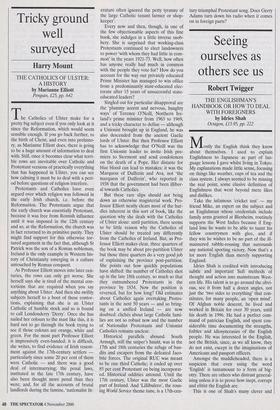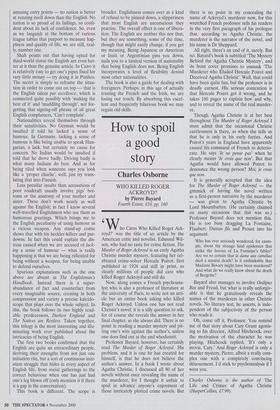Seeing ourselves as others see us
Robert Twigger
THE ENGLISHMAN'S HANDBOOK OR HOW TO DEAL WITH FOREIGNERS by Idries Shah Octagon, £15.95, pp. 222 Mostly the English think they know about themselves. I used to explain Englishness to Japanese as part of lan- guage lessons I gave whilst living in Tokyo. My explanations made little sense, focusing on things like weather, cups of tea and the class system. I always seemed to be missing the real point, some elusive definition of Englishness that went beyond mere likes and dislikes.
Take the infamous 'cricket test' — my friend Mike, an expert on the subject and an Englishman whose credentials include family arms granted at Blenheim, routinely supports the West Indies because if Eng- land lose he wants to be able to taunt his fellow countrymen with glee, and if they win he wishes to be no part of the ill- mannered rabble-rousing that surrounds any national sporting victory. Now that's a lot more English than merely supporting England.
Idries Shah is credited with introducing subtle and important Sufi methods of thought and action into mainstream West- ern life. His talent is to go around the obvi- ous, see it from half a dozen angles, not just the 'two sides to everything' that con- stitutes, for many people, an 'open mind'. Of Afghan noble descent, he lived and worked in Britain for over 30 years, until his death in 1996. He had a perfect com- mand of patrician English, and spent con- siderable time documenting the strengths, foibles and idiosyncrasies of the English people. He was interested in the English, not the British, since, as we all know, they do not exist, except in the imaginations of Americans and passport officers.
Amongst the muddleheaded, there is a suspicion that even using the word `English' is tantamount to a form of big- otry. There are others who distrust general- ising unless it is to prove how inept, corrupt and elitist the English are.
This is one of Shah's many clever and amusing entry points — no nation is better at running itself down than the English. No nation is so proud of its failings, so confi- dent about its lack of confidence. So, even as we languish at the bottom of various league tables that purport to measure hap- piness and quality of life, we are still, real- ly, number one.
Shah points out that having opted for third-world status the English are even bet- ter at it than the genuine article. In Cairo it is relatively easy to get one's pipes fixed for very little money — try doing it in Pimlico. The secret is simply to reframe the situa- tion in order to come out on top — that is the English talent par excellence, which is connected quite possibly with 'making the best of it' and 'muddling through', not for- getting that signing-off phrase of all great English complainers, 'Can't complain'.
Nationalities reveal themselves through their sensitivities. No German would be insulted if told he lacked a sense of humour. In Germany, lacking a sense of humour is like being unable to speak Hun- garian, a lack, but certainly no cause for concern. No Indian would be insulted if told that he drove badly. Driving badly is what many Indians do best. And as for being riled when someone says you look like a 'proper charlie', well, just try trans- lating that into Finnish.
Less peculiar insults than accusations of poor roadcraft usually involve pigs' bot- toms or the anatomy of your mother and sister. These don't work nearly as well against the English; in fact I know several well-travelled Englishmen who use them as humorous greetings. Which brings me to the English peculiarity of using humour as a vicious weapon. Any stand-up comic shows that with his heckler-killers and put- downs. In fact this could explain the dis- tress caused when we are accused of lack- ing a sense of humour — what is really happening is that we are being ridiculed for being without a weapon, for being unable to defend ourselves.
Spurious explanations such as the one above are absent in The Englishman's Handbook. Instead there is a super- abundance of fact and counterfact from every imaginable source, creating in both compression and variety a precise kaleido- scope that plays over the whole subject. In this, the book follows its two highly read- able predecessors, Darkest England and The Natives are Restless. Taken together, this trilogy is the most interesting and illu- minating work ever published about the intricacies of being English.
The first two books confirmed that the English are quite an extraordinary people, deriving their strengths from not just one initiation rite, but a sort of continuous initi- ation struggle that hides in every aspect of English life, from social gatherings to the correct behaviour when one has just had one's leg blown off (only mention it if there is a gap in the conversation).
This book is different. The scope is broader. Englishness comes over as a kind of refusal to be pinned down, a slipperiness that most English are unconscious they practise. The overall effect is one of libera- tion. The English are neither this nor that, but they are something, some of the time, though that might easily change, if you get my meaning. Being Japanese or American or Inuit or Argentinian pins you down, nails you to a limited version of nationality that being English does not. Being English incorporates a level of flexibility denied most other nationalities.
The book is also a guide for dealing with foreigners. Perhaps, in this age of actually trusting the French and the Irish, we are losing our touch. By absorbing this excel- lent and frequently hilarious book we may regain old skills.



























































































 Previous page
Previous page